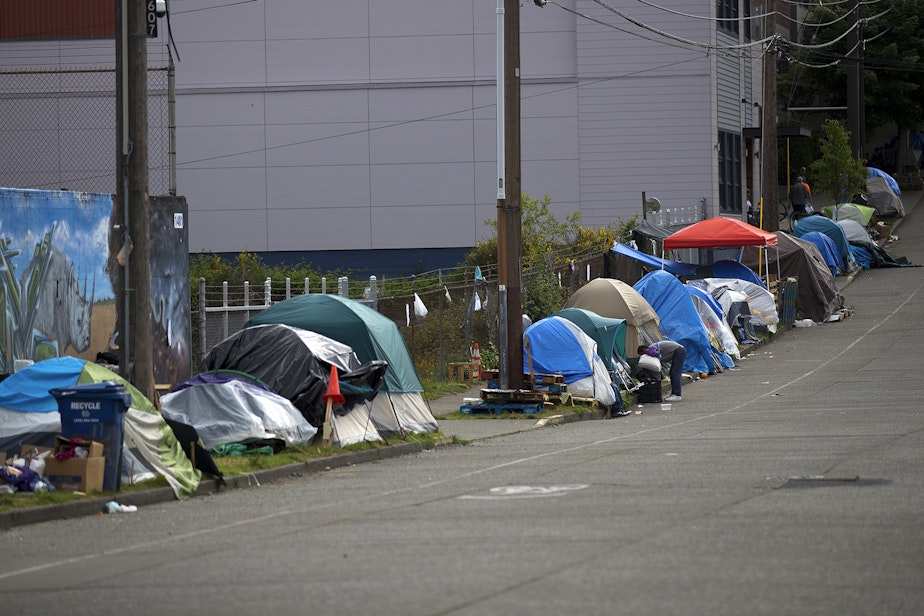'We need to be able to tailor our support': Chronic homelessness in King County

Seattle and King County leaders say focusing on chronic homelessness is a key part of addressing the region’s homeless community. That focus includes providing housing and services.
“We need to be able to tailor our support to what folks need,” said Marc Dones, the Chief Executive Officer at King County Regional Homelessness Authority.
Chronic homelessness is when a person has either been homeless for a year or more, or has been repeatedly homeless, while also dealing with a condition like substance abuse, severe mental illness, or a physical disability.
The intent of focusing on communities experiencing chronic homelessness is to allow the region to aid those who have not been appropriately focused on and meet their specific needs. And those needs range from nursing to psychiatric support.
Dones said keeping up with specific needs with support and services ensures that people don’t live outside again or at the wrong provider. It’s about the right match.
“Folks are offered things that don't make sense for them,” Dones said. “And so they decline or they might be offered something accept it, and they get there, that space is not staffed to respond to their needs.”
Sponsored
They say it’s also about life and death. The number of people surviving outside who die has increased over the past few years.
In Seattle, 178 people experiencing homelessness died from exposure to heat or cold, violent fights in encampments, and at least two died in vehicles from an overdose.
No single experience of chronic homelessness
Many of the people Dones comes across who are surviving chronic homelessness are veterans, families, youth or young adults. That population has not really had the attention and focus that they need. And as a result, they continue to be forced to live outside, Dones said.
King County's Department of Community and Human Services estimated that about 40,300 people were homeless in 2020. But the number of people experiencing chronic homelessness is still up in the air. Dones said the King County Regional Homelessness Authority is working on getting those numbers and getting them right.
Sponsored
“My expectation is that a lot of these numbers will go up before they start to go down,” they said.
Dones estimates that the number of people experiencing chronic homelessness falls between 10,000 and 15,000.
Wrap around services and lived experiences
King County’s regional plan for long-term housing includes wrap-around services and peer specialists. That means including people who are, and have been, chronically homeless throughout the planning process. For Dones, that lived experience is crucial.
“When there's an absence of lived experience, the process, frankly, loses touch,” they said.
Sponsored
That insight provides a major reality check.
“It is about being able to do things right the first time, because we actually tap into the right expertise and information," Dones said.
If Dones wants to know what’s going on in shelters, they call up one of their board members who is living in a shelter to make sure they and the rest of the team is getting it right.
“We start to do things that might make sense on paper, or might make sense for folks who have not experienced housing instability or significant behavioral health need, but absolutely fall apart when those plans touch the ground and the reality,” Dones said.
Mayor Harrell invests in affordable housing
Sponsored
On Monday, Seattle Mayor Bruce Harrell and the Office of Housing announced the city will invest $5.3 million in affordable housing.
The city says that this will be matched by the Washington State Department of Commerce.
The money will go to Sea Mar Community Health Centers, an organization that provides health care, education and cultural services, and housing. Sea Mar will use the funds to complete the acquisition of a 39-unit building specifically for women experiencing chronic homelessness.
And the money from the city will also help Sea Mar provide wrap-around services for the tenants of the new building like case management for health care or financial assistance.
“Expanding access to housing with services is core to ending the homelessness crisis, and this kind of acquisition and partnership is a crucial part of the city of Seattle’s strategy to take compassionate and urgent action,” Mayor Bruce Harrell said in a written statement on the investment.
Sponsored
Hear Soundside's full interview by clicking the audio above.



